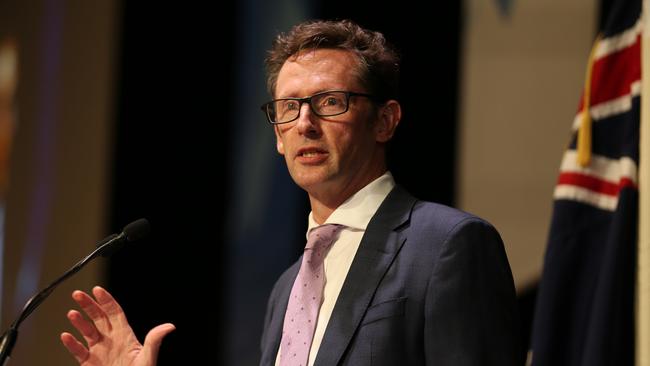Federal Financial Services Minister Stephen Jones launches attack on $3.3 trillion super industry
The government will issue a stinging rebuke of the $3.3 trillion superannuation industry’s dispute resolution processes and broad member engagement.

Financial Services Minister Stephen Jones will deliver a rebuke to the $3.3 trillion super industry’s poor member engagement, urging the sector to lift its game.
In a speech to be delivered on Thursday, Mr Jones will cite the corporate regulator’s unreleased review of super trustees’ internal dispute resolution arrangements, and say it should serve as a “wake-up call” for the industry.
“Customer experience needs to improve across the board. And in a competitive marketplace, it is on the funds to be better,” he will tell an industry event.
Mr Jones will draw on a new Australian Securities & Investments Commission review – to be released on Friday – that shows almost 20 per cent of super funds fail “to consistently respond” to complaints within the mandatory 45 day timeline.
“It is almost a 50:50 proposition whether funds will let complainants even know that delays are occurring,” he will say, noting that 80 per cent of funds were deemed to have “poor management of systemic issues” that may affect consumers.
“How is this acceptable,” Mr Jones will say. “Too often, I receive letters from members of the public who believe their fund takes them for granted.”

Mr Jones, who is also the Assistant Treasurer, will say the sector is on notice “to do better”.
The Labor federal government has, though, confronted criticism in the past for being too accommodating to some parts of the super sector, particularly industry funds with links to trade unions.
In this instance, Mr Jones will take a swipe at the entire industry and how it engages with members. He will cite letters from two constituents and their frustrations in dealing with their fund, including to obtain a benefit estimate and to inquire about two-factor authentication in the face of a surge in hacks and scams.
“John wrote saying he wanted to strengthen the security of his data for fear of scams. He was told two-factor authentication wasn’t possible. It is not good enough,” Mr Jones will say.
He will also note that the superannuation member trying to obtain a benefit estimate didn’t have his call answered and the complaint wasn’t processed.
“Over the last 12 months, $150bn was contributed to superannuation funds. Answering the phone should be a non-negotiable,” Mr Jones will say.
In recent weeks, some AustralianSuper members were plagued by issues in accessing or transacting on their accounts due to an upgrade of a key portal and mobile phone app. “As a result of an increased number of members contacting us, it’s taking longer to speak with a consultant over the phone or via online chat. We’ve redirected all available staff to assist members but understand this may be frustrating and we appreciate your patience,” AustralianSuper told its members.

The government has Treasury reviewing the Your Future, Your Super legislation, which includes an annual performance test that assesses the returns of MySuper products.
Debate has raged about the tax treatment of large super balances in the millions of dollars.
Last month, the Association of Superannuation Funds of Australia cautioned the Your Future, Your Super rules could discourage funds from reducing their exposure to coal stocks as part of their ESG strategy for fear of failing the performance test.
Mr Jones will on Thursday say member experience is “the missing piece” in the government’s reform project in the retirement system, given performance was being addressed through the calling out of underperforming funds.
“It should be the natural evolution of a competitive superannuation sector that is focused on delivering for members.”
He will highlight the government’s view that setting an objective around the purpose of super will help to address other structural issues the system confronts.
“This includes the existence of extremely high balance superannuation accounts which receive generous subsidies but cannot reasonably be connected to retirement income,” Mr Jones will say. “As a whole, the … system has done a good job in generating returns for members. However, the results have been very uneven.”
Mr Jones will outline the core tenets, in his view, of superannuation as being; political consensus, strong performance and member satisfaction.
“We want to ensure the contest around superannuation policy is directed towards strengthening the system, not destroying it. Because superannuation is a pact between the present and the future,” he will say.
Mr Jones will also criticise the Coalition’s policy of allowing members to access their super during the depths of Covid-19.
“During the pandemic, we saw the disastrous decision to undermine preservation through the early release program. A decision that will be felt for decades to come,” he will say. “These attacks will continue while there is no shared understanding of the objective of superannuation. It’s why we have committed to an informed conversation.”



